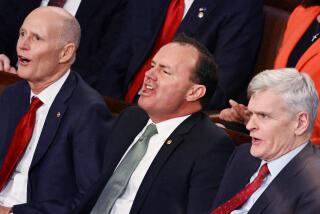Many Future Retirees to Lose Health Benefit
- Share via
WASHINGTON — WASHINGTON -- More than one-third of the nation’s large employers that offer health care to retired workers have recently stopped the benefit for future retirees or expect to do so within the next three years, a comprehensive survey released Thursday has found.
The report highlights yet another unwelcome consequence of spiraling health-care costs, which are rising at double-digit rates even though overall inflation is well under control. It foreshadows troubling ripple effects and even tougher policy decisions ahead as elected officials confront growing numbers of Americans without health insurance.
And with fewer employers subsidizing health coverage for their retirees, the cost pressure on the already strapped Medicare program will only increase.
There was a ray of good news in the survey, conducted by the Henry J. Kaiser Family Foundation and Hewitt Associates, a human resources consulting firm. All but 5% of the companies surveyed said they would continue to subsidize health insurance for current retirees and their spouses.
Yet 85% of them said they would continue to pass on more of the coverage costs to retirees. Over the last year alone, retiree contributions increased an average of 20%.
The study of 435 companies that employ more than 1,000 people and currently offer health benefits for retired workers was conducted online between July 2 and Sept. 9.
Drew Altman, president of the Menlo Park-based Kaiser Family Foundation, an independent health-care philanthropy, said: “Employer subsidized health-care coverage for retirees is not collapsing, but it is eroding.”
Even employers who are committed to doing right by their workers are struggling.
“It’s a balancing act,” said Randy Johnson, head of human resources strategic initiatives for Motorola Inc. “If we’re going to be able to provide benefits to future retirees” in an environment of rising costs and global competition, “we’re going to have to manage costs now.”
For current retirees, that is likely to mean reduced benefits and higher insurance premiums, deductibles and co-payments. But for older workers -- the very age group that has the hardest time buying individual policies -- it may mean no employer-provided coverage at all.
Twenty-two percent of employers surveyed said they were very likely or somewhat likely to terminate health benefits for future retirees within the next three years. An additional 13% said they had stopped offering health benefits to future retirees over the last two years.
“This is a trend we have been watching for some time,” Kate Sullivan, director of health policy for the U.S. Chamber of Commerce, said in an interview. “It means we have to look beyond employer groups to help people pay for health coverage.”
Given the extremely high cost of health insurance for individuals at or near retirement age, Sullivan said, retirees deserve a tax code “that gives them the same kind of tax benefits they had when they were working.”
Current fiscal policy encourages employers, in the form of a tax deduction, to provide health benefits to their employees, while also giving insured employees a tax break. They do not have to pay income taxes on the value of their benefits.
Some combination of tax deductions and tax-free medical savings accounts or IRA withdrawals should be offered to retirees as well, Sullivan said, at least until they qualify for Medicare.
The retiree health benefits currently offered by employers are significant, in both coverage and cost.
The typical package includes continuing coverage for surviving spouses of deceased workers; an annual limit of out-of-pocket expenses of $1,500 per retiree or $3,000 for a retiree and spouse; and generous -- usually unlimited -- prescription drug coverage.
The benefits give retirees who are younger than 65 sustained coverage that is far less expensive than an individual policy. For retirees 65 or older, the benefits provide valuable supplements -- primarily in the form of drug coverage -- to traditional Medicare.
The benefits provided by the surveyed companies, which cover a total of 5.4 million retirees and their family members, cost $12.5 billion in 2001, the employers reported. Estimated costs for this year are $14.5 billion, a 16% increase.
On average, employers paid 60% of the costs and retirees contributed the remaining 40%.
Motorola’s Johnson, whose company subsidizes health benefits for its 15,000 retirees, recommended several specific reforms to make coverage more affordable for both employers and employees before concluding, “It’s our system that we need to give attention to changing.”
As for changes to Medicare, Motorola and most other surveyed companies support a prescription drug benefit similar to other retiree health services covered by the government. This differs from the position of the Bush administration and congressional Republicans, who favor a drug benefit that would be administered by private insurance companies.
Thursday’s report is the latest sign that baby boomers could encounter financial difficulties in retirement. Current demographic trends, which show the current ratio of three workers to every retiree narrowing to 2 to 1 by 2030, already bode ill for both Social Security and Medicare financing.
For now, however, retiree health benefits continue to be one of the most valuable perks for American workers.
“Most of our people know one date for sure -- the date they’re eligible for retiree medical coverage,” said Johnson.
“They’re doing everything they can to stay employed until that date.”
More to Read
Inside the business of entertainment
The Wide Shot brings you news, analysis and insights on everything from streaming wars to production — and what it all means for the future.
You may occasionally receive promotional content from the Los Angeles Times.










